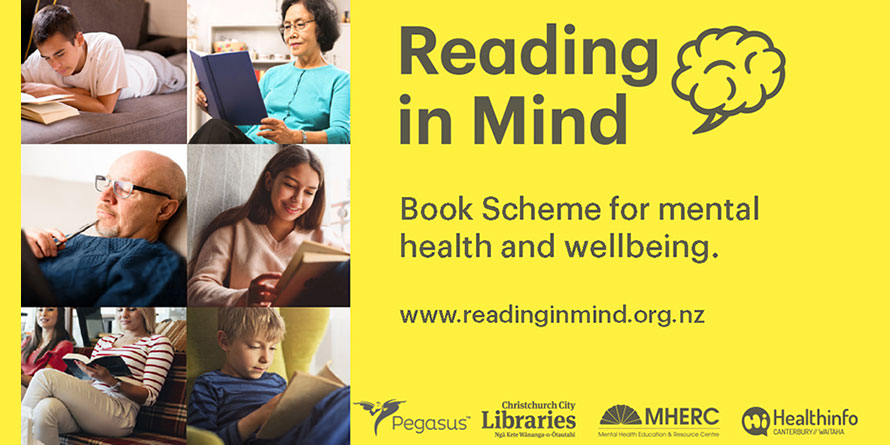Library customer Jessie Stanners highlights the Reading in Mind initiative, how it works for her, and how it can help in the COVID-19 lockdown
We find ourselves in unprecedented times. Alongside our new motto of 'Being Kind', there's a common sense of resilience, strength, community and acceptance.
Christchurch City Libraries have an amazing array of eBooks available to borrow free of charge on their website, (not only throughout lockdown, but all year round!) as well as an incredible book scheme, Reading in Mind.Reading in Mind was developed through a collaboration between Pegasus Health, Christchurch City Libraries, and the Mental Health Education Resource Centre, and HealthInfo Canterbury/Waitaha. The programme promotes the benefits of reading for mental health and wellbeing through books on mental illness, wellbeing and other free resources available in our city libraries and MHERC.
Free and easy to access, Reading in Mind provides lists and links for a wide range of resources such as bibliographies, memoirs and non-fiction books on specific topics including depression, anxiety, addiction and PTSD. The initiative also includes resources specifically for young people and children, allowing parents, caregivers and whānau to gain information on supporting not only their loved ones, but themselves, through challenging times.
The Reading in Mind book scheme is highly recommended by mental health professionals and The Mental Health Foundation NZ. It highlights positive and productive content in an easily accessible nature, the programme offers the community an additional resource for managing and treating mild to moderate mental health issues and distress for free, in the comfort and privacy of our own homes.
While it is always encouraged for anyone experiencing any form of mental distress to seek professional help, we don't always have immediate access to see a therapist, or sometimes we aren't comfortable with speaking up, and we can find a lot of comfort and coping techniques through positive content in our online feeds and in between pages. (Keeping it positive is extremely important - where possible, unfollow and disregard any negative content, people or things that simply do not align with what’s going on for you or don’t make you feel good!)
Reading literature such as self-help books and bibliographies has become a prevailing development in mental health therapy. Studies show that reading books and listening to podcasts of inspiring and relatable stories is an extremely helpful and practical form of therapy, 'bibliotherapy'. It is important and highly encouraged that this form of therapy is adopted alongside your regular healthcare practitioner where possible to ensure the material being consumed is suitable and safe for readers and their loved ones.
There is something incredibly empowering, inspiring and beautiful about sharing and reading stories of hope in supported, healthy and safe environments - we can relate and resonate with similar stories to our own - and here we find common ground where we find our own strength, hope, and realise we are never ever alone, and from here we begin to heal and move forward in a way that works for us.
We are seeing this in movements like Voices of Hope and advocates sharing personal stories of lived experience throughout online platforms and public events. The stigma surrounding mental illness has begun to be lifted, and we are becoming more comfortable with sharing our stories, and those of us who have 'been there' know from our own personal experiences that by sharing what we’ve experienced and learned from the bright side, we can help others who are finding themselves in the same struggles find their own hope and way through.
This can also be a beneficial time to keep a diary of our daily thoughts and feelings, acknowledging and writing down what's going on in our lives and in our minds can be a healthy way of beginning to understand what is going on for us personally, and may be a helpful coping mechanism if we find ourselves struggling. It is really important to supplement this with the support of a trusted loved one, therapist or helpline such as 1737 if we are finding our feelings difficult to navigate and manage, or simply just need to talk. Although we are in lockdown, there is always someone there to help you.
Entering the next levels of our alert system, its valuable to continue to take time to understand that we still are not all superheroes that can take up baking sourdough, or tick off a big to-do list around the house, especially those wrangling children, school work and working from home or those navigating the next unknown steps for your businesses, and of course, our essential workers - seriously, hats off to all of you!
If all you can do in a day is simply be, to rest and do absolutely nothing - that really is just as important as wiping the damn skirting boards or tackling lists. This is not a time to feel guilty for what we do or do not do with our days.There is no right or wrong here, and taking care of our mental well being should be our top priority.
Do whatever you need to get through, whatever that looks like for you, that’s the right way. There is no way to navigate the uncertain, we cannot control what goes on around us or what happens from here, but we can control our actions and attitude, and really importantly, being kind and taking care of ourselves and others.





Add a comment to: Reading in Mind